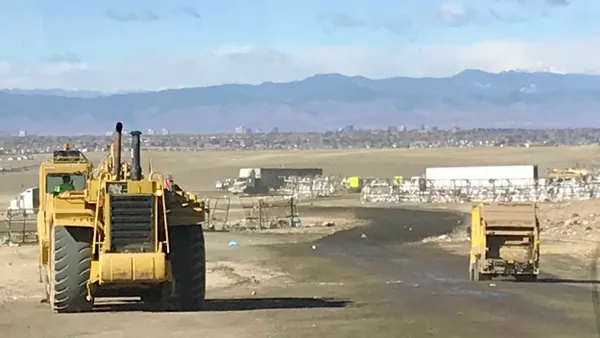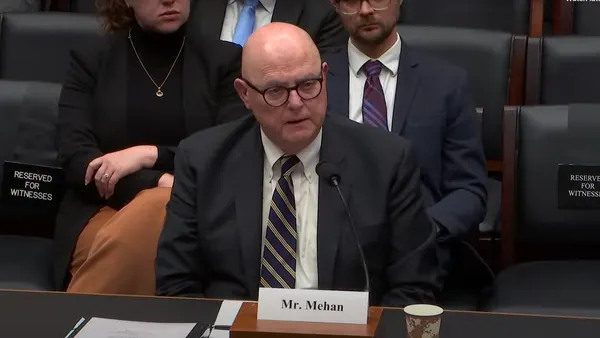Dive Brief:
- A group of Wisconsin landfill operators have formed a coalition as they seek to avoid shouldering the blame for toxic chemical contamination, WXPR reported last week. The coalition comes as landfills grapple with the looming fallout from the presence of per- and polyfluoroalkyl substances (PFAS) in the waste stream.
- Chemical companies like 3M, Chemours, and DuPont are the manufacturers of PFAS, but the substances have wound up in landfills, composting sites, and wastewater treatment plants. The new Wisconsin coalition argues those manufacturers should be responsible for cleanup associated with the contamination. They also aim to improve communication between landfills and wastewater treatment plants, in addition to coming up with both short and long-term solutions to the PFAS problem.
- "We are sick and tired of having the finger pointed at the solid waste industry," Meleesa Johnson, administrator for Marathon County's solid waste department and president of the Associated Recyclers of Wisconsin, told Waste Dive. "Until we actually have a conversation about the real cause and effect, we will only put a band-aid on the problem," she added.
Dive Insight:
PFAS are a non-stick family of thousands of chemicals linked to cancer that do not break down in the environment. Contamination from the chemicals poses a looming problem for the waste industry and how to deal with PFAS is emerging as a top concern going into 2020.
While documents show PFAS manufacturers and the U.S. EPA have known for decades about the health implications of the chemicals, the federal government has yet to impose regulations. EPA officials are currently under pressure to set a Maximum Containment Level (MCL) for PFAS, but so far the agency only offers a health advisory of no more than 70 parts per trillion (ppt) in drinking water for two of the chemicals, PFOA and PFOS.
Environmental and health groups have pushed for Congress to designate PFAS as hazardous substances under Superfund law — the legislation targeting sites so toxic they require government-backed clean-up projects. So far, those efforts have stalled. Most recently, Congress passed a defense spending bill only after stripping certain PFAS regulations from the final language.
Even as policy struggles to gain momentum, the waste industry is monitoring PFAS conversations.
"We're certainly tracking the issue and following it closely," said Brandon Wright, vice president of communications with the National Waste and Recycling Association (NWRA).
Wright directed Waste Dive to an issue brief on PFAS that NWRA published in April and said the organization is "looking into" the implications PFAS holds for the industry. That brief argues landfill operators do not typically use PFAS in their operations, but receive the chemicals through products in the waste stream, like popcorn bags, non-stick pans, cosmetics, clothing, and other items.
One source of concern is that landfills will take the blame for a problem they say originated elsewhere. Johnson, who is part of the newly-formed Wisconsin coalition, noted that consumer demand inevitably results in contaminated products winding up in landfills. She argued those in the solid waste space want a say in the solution-making process as it unfolds.
"We want to tell our story, our way," she said. "We want a collective discussion about the issue and we need to look to global solutions."
At least one waste giant is also lobbying on PFAS. Senate lobbying disclosures show Waste Management has been engaged on the PFAS Waste Incineration Ban Act of 2019, which would prohibit the disposal of PFAS-contaminated fire fighting foam via incineration. The company also spent more than $200,000 on lobbying relating to PFAS in the first three quarters of 2019.
Waste Management is one of several companies facing increased scrutiny over PFAS. The company's Turnkey Landfill in New Hampshire sent 250,000 of leachate potentially contaminated with PFAS to a wastewater treatment plant out of state, resulting in the chemicals possibly entering Maine's Kennebec River. The company has argued it had no legal obligation to test for the chemicals, but the incident sparked public outcry.
A number of states are meanwhile moving ahead without the federal government and seeking to regulate PFAS themselves, including Vermont, New Hampshire, Massachusetts, Michigan, New Jersey, California, and Pennsylvania. They're also meeting with resistance. At the end of November, a judge granted a preliminary injunction against New Hampshire's strict new PFAS testing requirements. Those regulations target landfills and wastewater treatment plants, in addition to water systems.








